
Kozhikode, also known in English as Calicut, is a city along the Malabar Coast in the state of Kerala in India. It has a corporation limit population of 609,224 and a metropolitan population of more than 2 million, making it the second largest metropolitan area in Kerala and the 19th largest in India. Kozhikode is classified as a Tier 2 city by the Government of India.
The Malayali people are a Dravidian ethnolinguistic group originating from the present-day state of Kerala in India, occupying its southwestern Malabar coast. They are predominantly native speakers of the Malayalam language, one of the six Classical languages in India. The state of Kerala was created in 1956 through the States Reorganisation Act. Prior to that, since the 1800s existed the Kingdom of Cochin, the Kingdom of Travancore, Malabar District, and South Canara of the British India. The Malabar District was annexed by the British through the Third Mysore War (1790–92) from Tipu Sultan. Before that, the Malabar District was under various kingdoms including the Zamorins of Calicut, Kingdom of Tanur, Arakkal kingdom, Kolathunadu, Valluvanad, and Palakkad Rajas.
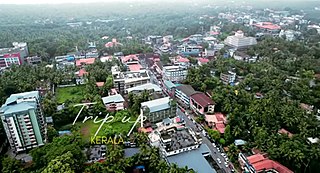
Vatakara, also spelled Vadakara, IPA: [ʋɐɖɐgɐɾɐ], French: Bargaret, is a Municipality in the state of Kerala, India. Vatakara is located between Kannur and Kozhikode. The municipality of Vatakara covers an area of 23.33 km2 (9.01 sq mi) and is bordered by Mahé to the north and Payyoli to the south. It is the headquarters of Vatakara taluk, which consists of 22 panchayats. During the reign of the Kolathiris and Zamorins, Vatakara was known as Kadathanadu. During the British Raj, it was part of the North Malabar region of Malabar District in the state of Madras. The historic Lokanarkavu temple, made famous by the Vadakkan Pattukal, is situated in Vatakara. A new tardigrade species collected from Vadakara coast has been named after Kerala State; Stygarctus keralensis.

Kizhakke Potta Kesava Menon was a patriot, idealist and Indian independence activist. Menon was the founder of Mathrubhumi, a popular daily newspaper which earned the second place in circulation in Kerala. In 1924, he led the Vaikom Satyagraha in Travancore. He was awarded the third highest civilian honour, Padma Bhushan, by the Government of India in 1966. He was conferred with an honorary doctorate (D.Litt) posthumously by University of Calicut in 1987.

Kozhikode, or Calicut district, is one of the 14 districts in the Indian state of Kerala, along its Southwestern Malabar Coast. The city of Kozhikode, also known as Calicut, is the district headquarters. The district is 67.15% urbanised.
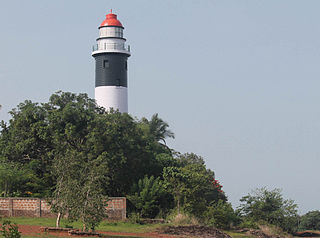
Koyilandy is a municipality and a taluk in Kozhikode district, Kerala on the Malabar Coast. The historical town is located right in the middle of the coast of Kozhikode district, between Kozhikode (Calicut) and Kannur, on National Highway 66.
The Kavalappara is an aristocratic Indian Nair family. In medieval Kerala, they served as part of the landed nobility and were sworn to the service of the rajas of the area, first that of Palghat and then later that of Cochin. Based at Kavalappara Desam in Karakkat, Valluvanada, their holdings extended to areas such as Kailiad and Panayur.
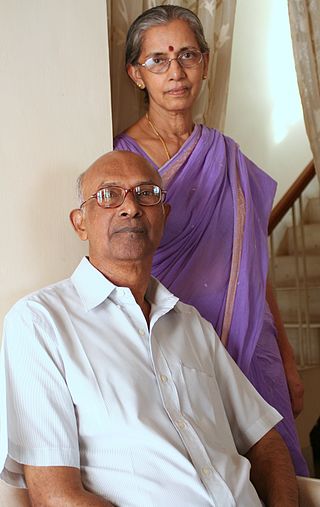
Kattungal Subramaniam Manilal is an Emeritus of the University of Calicut, a botany scholar and taxonomist, who devoted over 35 years of his life to research, translation and annotation work of the Latin botanical treatise Hortus Malabaricus. This epic effort brought to light the main contents of the book, a wealth of botanical information on Malabar that had largely remained inaccessible to English-speaking scholars, because the entire text was in the Latin language.
P. Kunjanandan Nair, better known by his pseudonym, Thikkodiyan, was an Indian playwright, novelist, lyricist and screenwriter of Malayalam. He was known for his contributions to the genre of radio plays and his autobiography, Arangu Kaanatha Nadan, which detailed the socio-cultural development of Malabar in the post-independent period, fetched him a number of awards including the Kendra Sahithya Academy Award, Kerala Sahitya Akademi Award for Biography and Autobiography, Vayalar Award and the Odakkuzhal Award.
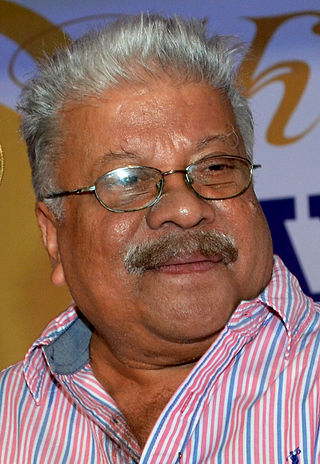
Punathil Kunjabdulla was an Indian writer from Kerala. A medical doctor by profession, Kunjabdulla was a practitioner of the avant-garde in Malayalam literature. His work includes more than 45 books, including 7 novels, 15 short story collections, memoirs, an autobiography and travelogues. His work Smarakasilakal won the Central and State Akademi Awards.

Kudiyirikkal Narayanan Ezhuthachan, commonly known as Dr.K.N.Ezhuthachan was an Indian writer and scholar of Malayalam literature. He was one among the principal followers of the idea of social impact on literature. Ezhuthachan supported Marxist literary criticism and interpreted Indian literary works based on Marxist aesthetics. He won the Sahitya Akademi Award for his work Keralodayam, a long narrative poem written in Sanskrit. He is the first Malayali to win Sahitya Akademi Award in sanskrit literature. He died on 28 October 1981 while delivering a lecture at Calicut University.
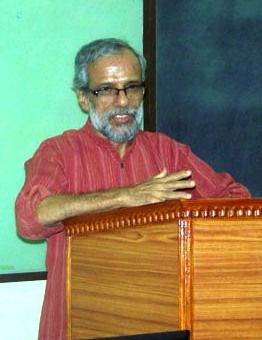
Rajan Gurukkal is a leading Indian social scientist, historian, professor and writer. He has written many books and articles on different topics. He has also received awards for his works.

Akbar Kakkattil was an Indian short-story writer and novelist from Kerala state.

Malappurath Raman Chandrasekharan, popularly known as M.R. Chandrasekharan or simply M. R. C., is a Malayalam literary critic and author from Kerala, India. Chandrasekharan has published more than 50 books in different literary sections like literary criticism, translations, politics, social etc. He also works in the field of journalism and education. He won the 2010 Kerala Sahitya Akademi Award for Literary Criticism.
Ezhuthachan(pronunciation, Malayalam: എഴുത്തച്ഛൻ, eḻuttacchan), also known as Kadupattan(pronunciation, Malayalam: കടുപട്ടൻ, kaṭupaṭṭan) is a caste native to the Indian state of Kerala. It is classified as an Other Backward Class by the Government of India under its system of positive discrimination.
Kadathanat Madhavi Amma was an Indian poet, novelist and short story writer of Malayalam literature. Known for poetry anthologies such as Kalyopaharam and Kanikkonna, she was also the author of two works based on Vadakkan Pattukal viz. Thacholi Othenan and Payyamvelli Chandu. The Kerala Sahitya Akademi awarded her their annual award for overall contributions in 1996.

Rao Sahib Ayyathan Gopalan, popularly known as Darsarji and Darsar Sahib, was an Indian doctor, surgeon, professor, writer, philanthropist, social reformer, and Renaissance leader from Kerala. He is the founder of the Sugunavardhini movement (1900) and Depressed classes mission (1909) and also the leader and propagandist of Brahmo Samaj (1893) in Kerala. He denounced idol worship and fought to end those social practices in Kerala that he thought were unethical. Among his followers were Brahmananda Swami Sivayogi, Vaghbatananda, and Brahmavadhi P. Kunhiraman. Gopalan titled P. Kunhiraman as "Brahmavadhi" and Sivayogi as "Brahmananda Swami".

Dr. Ayyathan Janaki Ammal (1878 –1945) was the first female doctor in Kerala and also in Malabar region which was an administrative district of Madras Presidency during British rule in India. She was also the first female doctor from the Thiyya community and also hailed with the title as the first Malayali lady doctor and surgeon. and the sister to Ayyathan Gopalan. a social reformer of Kerala, the founder of the Sugunavardhini movement (1900), Depressed Classes Mission (1909) and the leader and propagandist of Brahmo Samaj in Kerala.

South Malabar refers to a geographical area of the southwestern coast of India covering some parts of the present-day Kerala. South Malabar covers the regions included in present-day Kozhikode taluk of Kozhikode district, the whole area of Malappuram district, Chavakkad taluk of Thrissur district, and Palakkad district, excluding parts of Chittur taluk. The Fort Kochi region of Kochi city also historically belongs to South Malabar. The term South Malabar refers to the region of the erstwhile Malabar District south to the river Korapuzha, and bears a high cultural similarity to both the Cochin and the North Malabar region.
Choorayi Kanaran (1812-1876) was the first Deputy Collector of India. He was born into a prominent family. He was also the first Municipal Chairman of Kerala.














